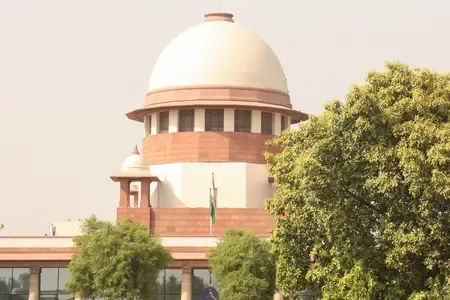Can Governors Really Withhold Assent to Bills Indefinitely?

Synopsis
Key Takeaways
- Governors cannot withhold assent indefinitely.
- Only three options are available for action on Bills.
- The elected government holds the primary executive power.
- Judicial review applies to Presidential decisions on Bills.
- This ruling enhances legislative accountability.
New Delhi, Nov 20 (NationPress) The Supreme Court declared on Thursday that Governors are not permitted to indefinitely withhold assent to Bills approved by state legislatures. The ruling emphasized that the Constitution delineates three clear alternatives: grant assent, return the Bill with comments, or refer it to the President.
A Constitution Bench led by Chief Justice of India (CJI) B.R. Gavai addressed a Presidential reference made under Article 143, affirming that while the Governor possesses limited discretion under Article 200, this discretion is strictly limited to the options specified in the Constitution.
The five-judge Bench, which included Justices Surya Kant, Vikram Nath, P.S. Narasimha, and Atul S. Chandurkar, asserted, “The Governor lacks the authority to simply withhold assent.”
The apex court further clarified, “The three clear options available to the Governor are to either grant assent, return the Bill to the legislature with comments, or refer it to the President.” It stressed that this discretion does not permit the Governor to hold Bills indefinitely.
The Bench noted that the constitutional framework positions the elected government “in the driver’s seat.” The court stated, “The Cabinet should hold the executive power, and there cannot be two centers of executive authority.” This statement countered the Centre's claims that Article 200 grants the Governor unrestricted discretion.
The Supreme Court observed that it would be “unfathomable” to assert that the Governor does not have discretion under Article 200, especially since the Council of Ministers is unlikely to advise the Governor to return a Bill or reserve it for the President.
Additionally, the court highlighted that the President “cannot exercise this option unless the Governor reserves the Bill for his assent.” This opinion was delivered in response to a Presidential reference seeking clarity on the timing of gubernatorial and presidential assent, following a ruling by a 2-judge Bench that deemed Governor R.N. Ravi's prolonged inaction on 10 Bills as “illegal and arbitrary.” This earlier ruling set a three-month deadline for both Presidential and gubernatorial approval of Bills that had been passed by the legislature twice.
In July, the Constitution Bench had issued notifications to all states regarding the matter titled “In Re: Assent, Withholding or Reservation of Bills by the Governor and the President of India.” Earlier, in April 2025, a Bench of Justices J.B. Pardiwala and R. Mahadevan invoked their extraordinary powers under Article 142 to enforce a three-month deadline for Presidential decisions on reserved Bills, effectively subjecting Presidential actions to judicial review.








